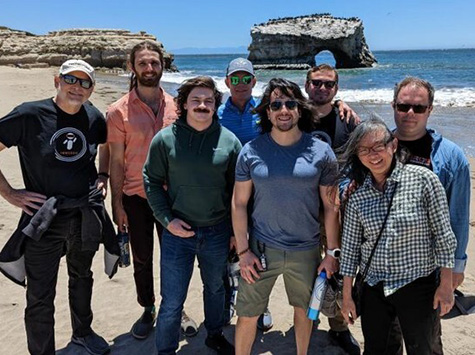Health
UCSC alumni awarded large NSF grant to grow virtual reality physical rehabilitation startup Immergo Labs
The National Science Foundation awarded three Baskin Engineering alumni with a $1,000,000 Small Business Innovation Research grant to support the research and development of an extended reality platform for full-body physical rehabilitation.


The National Science Foundation (NSF) awarded three Baskin Engineering alumni with a $1,000,000 Small Business Innovation Research grant to support the research and development of an extended reality platform for full-body physical rehabilitation.
Aviv Elor (B.S., Robotics Engineering, ’19; Ph.D., Computational Media, ’21), Michael Powell (Ph.D., Computer Engineering, ’21), and Ash Robbins (B.S., Robotics Engineering, ’18; Ph.D., Electrical and Computer Engineering, ‘24′) co-founded Immergo Labs, a company which uses artificial intelligence and virtual reality to incorporate telehealth capabilities and enhance remote physical therapy care.
Immergo Labs was inspired by a multi-year research effort at UC Santa Cruz in co-designing immersive virtual reality games and tools for physical and occupational therapy — reflecting Baskin Engineering’s focus on developing technology with positive social impact.
The trio met in 2016 while working as student assistants in the Assistive Sociotechnical Solutions for Individuals with Special needs using Technology (ASSIST) Lab and Mircea Teodorescu’s Lab.
ASSIST Lab director and Professor of Computational Media, Sri Kurniawan and Associate Professor of Electrical and Computer Engineering Mircea Teodorescu advise the Immergo Labs team, contributing to the strategy for research study design, accessibility, partnerships, and grant funding.
“These labs are highly unique in that Sri and Mircea promote a family-like culture where students and professors work as peers. This culture helped influence the way we run Immergo today,” Elor said.
In 2020, Professor of Electrical and Computer Engineering Marco Rolandi informed Elor about a local Bay Area NSF Innovation Corps program, which the trio joined to gain experiential training and take their ideas beyond the university laboratory.
“From this program, we pivoted away from stroke rehabilitation exercise games while identifying a burning need for better telehealth and hybrid care tools for physical rehabilitation,” Elor said.
The team applied for the NSF Phase I Small Business Innovation Research program with the focus on an extended reality hybrid care platform for physical rehabilitation. They won the Phase I grant in 2021 and established Immergo Labs Inc.
During Phase I, the Immergo team discovered two major unmet needs for outpatient physical rehabilitation: accessible full-body movement evaluation tools and a cost-effective gold standard for biomechanical assessment. They conducted studies which yielded promising outcomes for their extended reality platform — including accurate prediction of balance sway and improved efficiency in evaluation time compared to video conferencing and in-person methods.
With Phase II funding now secured, Immergo Labs aims to expand the platform’s development and further demonstrate its capabilities.
“This funding will enable us to greatly advance our research and development efforts by directly co-designing with clinicians and patients, extending our platform for full-body assessment, and beyond. It will also allow us to scale our operations and refine our technology based on real-world feedback,” Elor said.
The team will also improve the companion app’s user experience, and validate and set norms for biomechanical measures through a series of studies, including a large-scale study with the Houston Veterans Affairs.
Immergo Labs hopes to enhance accessibility, improve patient outcomes, and set new standards of care in physical rehabilitation through its emerging technology.
The NSF will provide up to $500,000 for matching funds with eligible investments — contact invest@immergolabs.com if interested in investing, or join the waitlist on www.immergolabs.com to hear more updates.